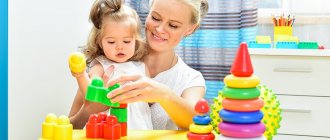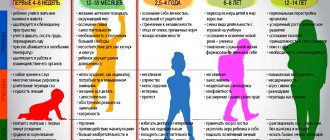It is best to start raising children from the first weeks of his life. From birth to one year, this is the time of active physical development of the baby, his adaptation to the environment and the acquisition of experience. It will take only twelve months for the baby to learn to smile, coo, recognize the voices of his parents, distinguish intonations and respond to their mood. During infancy, parents pay the main attention to maintaining a diet and proper care, but we must also not forget about raising the child. It is before one year that the baby’s basic habits are laid down on a subconscious level, his inclinations and personal characteristics are formed. The further development of the child largely depends on his upbringing until he is one year old. Conventionally, this period is usually divided into 4 stages, each of which covers three months.
Raising a child up to one year: four main periods
- From birth to three months.
- From three to six months.
- Six to nine months.
- From nine months to a year.
First period
The first stage lasts from the moment the child is born until he is three months old. During this period, parents must form good habits in the baby and prevent the emergence of harmful ones, lay the foundations of communication, and develop sensory perception. Also, during this period, parents need to properly organize their diet; this is important for normal weight gain and the formation of a habit of a diet. In the first three months, the baby should develop the following habits:
- falling asleep outside without a pacifier;
- hold head;
- spend some time in bed, entertaining yourself;
- show signs of dissatisfaction when it is necessary to change a diaper;
- fall asleep without motion sickness;
- navigate in space, responding to sounds and light.
Particular attention must be paid to the baby’s hygiene. Every morning should begin with a mother’s friendly smile and hygiene procedures. They consist of washing the face and hands, changing the diaper and washing. Daily procedures will form a healthy habit of cleanliness in your baby. It is unacceptable for residual urine or feces to irritate the baby's skin, so diapers should be changed every three hours. Since children's skin is very delicate, its surface is treated with cream or powder.
To form the habit of holding the baby's head, it is necessary to lay it on his tummy, even if he expresses dissatisfaction. Gradually, this procedure will become a habit for him, the muscles of his neck and back will be trained. Every day he will spend more and more time on his stomach and contemplate the world around him from a different position.
How to develop the habit of talking? In order for a child to start cooing, you need to play with him. It’s good that when the baby hears songs and nursery rhymes. Each action that is directly related to the child should be commented on, telling how to put on pants, a blouse, and how to change a diaper. When talking with your child, you should smile, this way a culture of communication will be established.
Important article: hygiene of a newborn baby
SO, the main tips and recommendations that you need to follow:
- For the normal development of the child’s psyche, it is necessary to constantly talk with the baby, sing songs, tell nursery rhymes, and turn on music to listen to. For the first games with the baby, it is worth choosing toys that promote the development of sensory perception;
- When the baby reaches the age of one and a half months, to strengthen physical health, it is necessary to lay the baby on his stomach every day, do exercises and massage;
- An important educational point is the need to teach a child to sleep in his own crib and spend some time in it on his own. (See useful material on how to teach a child to sleep separately);
- To prevent your baby from developing a bad habit in the future, do not allow him to suck his fingers.
Toys and games from 0 to 3 months
For babies up to 3 months, educational psychologists recommend toys that develop sensory, hearing, vision and coordination of movements:
- Rattles, bells, bells, etc. To develop hearing, ring a rattle in one ear of the baby, then in the other. Soon the baby will begin to turn his head towards the sound source;
- Bright toys made of various materials that you can grab and stroke. First, they are shown to the baby, stroked over the baby’s body, and placed in the baby’s hand. Soon the baby himself will begin to grab them and confidently hold them;
- A variety of mobiles (carousels) that are attached above the baby’s crib. Toys are placed at a short distance from the baby’s eyes (about 15-20 cm). See the article about music mobiles for the crib;
- Bracelet with a bell , which can be worn alternately on different hands;
- A balloon that can be tied to your hand. Soon the baby will understand that the ball moves thanks to the movements of his hand;
- Schematic representation of a human face . Babies love to look at such images. If you place the picture at a short distance from the baby’s eyes (approximately 25-30 cm), he will be interested in studying it while his mother is not around.
Types of raising a child
Parents are teachers who work seven days a week. Every action is an element of education, whether mom and dad want it or not.
Types of family education:
- physical,
- moral,
- environmental,
- intellectual,
- patriotic,
- gender.
Read more about types of education.
Specifics of family education: continuity, emotionality, stability of influence.
By style, education can be authoritarian, permissive, democratic:
- The authoritarian style is characterized by parental pressure, demandingness, and rigidity. This can cause distrust and passivity of a person in the future.
- With the permissive style, the child is left to his own devices. There is a high risk of developing lack of initiative and lack of independence.
- Democratic style has a beneficial effect on personality. Involves trust in relationships, mutual respect, and development of the child’s interests and abilities. The democratic style promotes activity, independence, and determination of the child.
In addition to the authoritarian and permissive style, there are three more types of family education that adversely affect personality development:
| Style name | Description |
| Family idol | The child’s whims are indulged, his personality is placed at the head of the table. Permissiveness and admiration create overvaluation and selfishness. |
| Cinderella | The child is punished and a lot is demanded of him. This style provokes low self-esteem and the formation of aggression. |
| Overprotection | Excessive care that deprives the child of independence, mistakes, and personal experience. Overprotection is more common in mothers than in fathers. |
Important! Parents and grandparents should adhere to the same parenting style. Inconsistency of opinions causes internal contradictions in the child and forms duplicity of character.
Second period
It lasts from the third to the sixth month, during which time active sensory, auditory and visual perception and development occur. The second stage includes preparing the baby for future speech. To do this, he can play music of different genres, the main thing is that it is light and melodic. Classics, children's songs, modern pop, folk motifs - everything will do. In order for the baby to hum, babble, and squeak, his attention must be paid to other sounds. The child needs to be introduced to the world around him, drawing his attention to the rustling of leaves, the chirping of sparrows, the sound of flowing water - this is where cognition lies (for example: here is the rain knocking on the windowsill, here are the birds chirping, but here is the rumble of a tractor, etc.) .
The mental development of a child of this age begins with communication. Parents should play with the child, developing his visual, tactile and auditory perception. You should start classes with your child during a period of active wakefulness, when the child is cheerful and nothing bothers him. Otherwise, the classes will not give the expected result. The child should enjoy the activity/game, so it should be abandoned if the baby is hungry, sick or naughty. During this period, the foundations of moral and aesthetic education are laid, which the child receives through communication with adults.
The joy and love given to the baby will become the foundation for the formation of moral and aesthetic education.
Massage and exercises must be included in a child’s daily routine. During this period, exercises become more varied and prepare the baby for crawling. We recommend looking at the massage section
Toys and games for ages 3 to 6 months
All toys that were used before the age of 3 months are suitable for playing with your baby. It is worth adding to them:
- Teethers and other toys for chewing and sucking, because at this time children begin to cut their first teeth (how to choose teethers);
- Easy to grip ball. Already at the age of six months, a toddler can play with him, sitting in a stroller or in his mother’s arms;
- Soft large cubes with various pictures on the edges. Kids are happy to grab them, toss them, and look at the pictures;
- Rubber and fabric figurines of various animals . At this age, it is useful to play the game “Who does what?” with your baby. We show the dog and voice it: “woof-woof”, etc. Soon the baby himself will “name” the toy using the appropriate sounds;
- Six-month-old children love to tear paper , give your baby old magazines and let him satisfy his curiosity;
- A finger show will be entertaining for the little one . Put finger toys on your hands (you can buy them in the toy department or make them at home) and put on a show for your baby;
- The baby begins to get to know his body. To do this, you need to show the little one and name parts of the body : eyes, ears, nose, legs, arms...
Act intelligently
Try to plan ahead how you will raise your child. What actions and decisions may be required of you in the future. What are you hypothetically willing to do, and what do you completely disagree with?
“The only thing that happens unexpectedly is surprises. It is unlikely that you will want to rely on chance in raising your children. I've seen parents leave things to chance—you'd better not do that again. It’s much better to approach parenting purposefully, with a specific plan of action.”
Third period
The third period in raising a child up to one year old covers the age from 6 to 9 months. At this stage, the toddler becomes restless and inquisitive. In children of this age, activity increases significantly. Since babies already know how to crawl, sit down, try to get up, and some even walk, it’s time to pay attention to physical training.
Give your child the opportunity to move freely around the house. To do this, it is necessary to secure all premises as much as possible (remove wires, breakable objects, household appliances). All children at this time strive to explore the contents of the cabinets. Do not interfere with the baby, just remove all dangerous objects and fill the cabinets with toys and things that the baby can play with.
For good physical shape, we continue to do exercises and massage, incorporating new movements and exercises.
You should not put your child in a walker; such devices for learning to walk are harmful to a fragile spine. All the PROS and CONS of walkers are described in this article. It's up to YOU to decide. The debate over walkers will never end.
At this stage, you can begin to potty train your child by sitting him down after sleep and feeding, before and after a walk. After some time, the child will understand why this is being done. We are reading a very useful article about how to properly potty train – https://razvitie-krohi.ru/razvitie-rebenka-do-goda/kak-priuchit-rebenka-k-gorshku.html
From about seven months, a child should be taught to wash their hands before eating. After some time, the baby will get used to this procedure and will independently place its hands under the running water. This is how the concept of cleanliness is developed.
By putting on a bib before feeding and immediately changing soiled clothes to clean ones, mom instills the habit of neatness. Moreover, parents must pronounce and explain each of their actions: walking around in dirty things is ugly and indecent, so now we are changing into clean clothes.
Teach your baby to eat with a bib, explaining why this item is needed. Wash your little one's hands before eating; this will eventually develop into a good habit.
After six months, children begin to teethe. To take care of the oral cavity, you need to purchase a special toothbrush for your baby, intended for children under one year old, and teach the little toothbrush to use it daily.
Play activities for a child are important at any age, not excluding the age up to one year. This is how kids learn about the world. From six months you can already show your baby palms and a bell, commenting on each movement. From seven to eight months they demonstrate how the simplest toys work: a ball rolls, the wheels of a car spin, a spinning top spins in one place. At the same time, you can begin to show parts of the face: nose, eyes, teeth, ears, forehead. Of course, understanding will not come immediately; first, children will find them from their parents and toys, and only then from themselves. You can come up with a simple song to which your child will be happy to demonstrate his knowledge. You need to work with children of this age every day.
At this stage, it is necessary to introduce the child to the words “no” and “impossible” . If a child fights while playing, you need to take his hands and say the word “no” with explanations (it hurts, I feel unpleasant). It is necessary to explain the reason so that the child learns to react to the forbidden word, otherwise he simply will not notice it.
Read an article on the topic: how to tell a child NOT to
Regarding the word “impossible”, look at the video:
Starting from 6 months, the child actively develops his first speech skills. Read poems and nursery rhymes to your baby, look at pictures, play little shows with toys, constantly talk to your child kindly and affectionately, without distorting the correct pronunciation of words.
Toys and games for ages 6 to 9 months
Pay attention to the new educational toys:
- Musical centers that develop auditory attention and coordination of movements. Often such toys voice various animals, musical instruments, etc. Show your baby how to press the buttons, he will quickly master the toy and play with it for a long time;
- Musical toys (pipe, xylophone, drum) help develop coordination of movements and auditory perceptions;
- Play centers for developing fine motor skills . Your little one will be happy to manipulate and study different shaped figures;
- Books made of fabric, plastic, cardboard will help develop understanding of speech, fine motor skills and cognitive interest;
- Bath toys . Ducks, boats, fish - these swimming animals develop cognitive abilities and motor skills (how to choose bath toys);
- Almost all children of this age enjoy playing in the kitchen with dishes . Share plastic containers, spoons, ladles, and molds with your baby.
Allow your child to argue with you
It’s normal to argue and defend your opinion. Teach your child how to conduct constructive dialogue and discussion by example. Then you won't end up with a typical, foaming-at-the-mouth debater.
“At the same time, you don’t need to be a dictator who suppresses the slightest signs of disagreement. It is natural to disagree and argue. Showing disrespect is another matter. Arguing proves that you are doing your job as parents. They show that children are growing up and that they have their own opinions about everything.”
The fourth period
Raising a child from nine months to a year covers all areas of the baby’s activity: during this period of time he actively communicates with adults and tries to walk independently. Encourage your little one when he stands up on his own. Lead the child, first holding both and then one hand. Finally, the moment will come when the child will be able to hold himself in a standing position for several seconds without support. Get him interested in this with a toy that needs to be placed in both hands. (teaching a child to walk - 10 important tips). You cannot forbid a child to get up where he is comfortable, otherwise he will feel that getting up on his feet is generally prohibited and will stop trying.
The mental development of a child consists of instilling the skill of performing actions with objects. You need to show your child how to beat a drum, roll a car, blow a whistle, pick up and eat an apple, etc. A theatrical performance with finger toys is good for developing a child’s imagination, memory and speech, even if they are the simplest.
Closer to one year, the child is introduced to the different shapes of objects, their sizes and materials. You can sort cubes with cubes, and balls with balls, looking only for wooden or plastic objects. It is easier to choose according to the ratio when a pyramid is folded or a matryoshka is assembled. How a child is surprised when inside one doll there is another, smaller one!
Full-fledged education includes close communication with the baby. You need to talk to your child constantly, but copying his speech and lisping is not recommended. In this way, you can provoke the development of a speech defect, which will then have to be corrected with the help of a speech therapist. The baby should not think that distorted sounds are correct; he should hear only clear speech.
Nurture in your child, through your own example and method of explanation, a kind attitude towards loved ones, animals and the world around him. Praise and encourage good deeds, stop negative actions. It is necessary to create a friendly atmosphere in the family, so the style of your relationship will become a model for the child. If during games a child begins to fight and push, you need to stop these actions without a smile, using the word “no” . The prohibition should sound strict and categorical so that the child pays attention to it and takes these words seriously. It should be remembered that children copy the behavior of the adults around them in everything. Sometimes it is the behavior of parents that provokes bad actions towards other children, so before introducing a ban, you should reconsider your behavior.
Continue your exercise routine by incorporating new exercises.
To develop speech, memory, and attention, continue to read poetry with your child (the best examples would be the works of A. Barto, K. Chukovsky), play finger games, arrange mini-performances with finger puppets, and conduct music classes.
Closer to the age of one, the baby should show various parts of his body, make “okay” gestures, wave “bye-bye”, learn to play with toys correctly (carry a car, roll a ball, blow a pipe, etc.). Teach your child to eat independently, first with his hands, and then use a mug and spoon.
Toys and games for ages 9 to 12 months
In the last trimester, the following toys for the development of babies will be relevant:
- Pyramids . By the age of one year, the baby can already string pyramid rings if he is shown how to do it;
- Cubes . Show your little one how you can build a tower out of them and then collapse it;
- Wind-up toys;
- Matryoshka dolls;
- The cars will be useful for both boys and young princesses. With their help, the baby should learn how to play with such toys correctly;
- A rocking horse and a rolling car , in which you can ride, pushing with your feet, will contribute to physical development;
- Rolling toys with a long handle will develop coordination and walking skills;
- An excellent tool for studying different parts of the face and body would be a large doll (preferably one made of soft material).
Take whims seriously
Pay attention to your child's behavior and whims. In this way he expresses what he is not yet able to say in words. Every gesture, grimace and antics of your child is an appeal to you or a protest. Just be careful.
“Behavior is simply a form of communication. Climbing out of a window at night and running away from home is a kind of saying. Children are much more willing to express their thoughts and feelings through behavior than through words. The main reason is that they still have few words. They have a lot of feelings, but they don’t yet know how to choose the right words and expressions to express these feelings.”
Behavior and psychology of a child aged 3 to 5 years
The baby begins to perceive himself as an independent person, becomes aware of his gender, and learns the differences between girls and boys. Parents should not be confused when asked about anatomy; they need to be able to correctly, without going into detail, reveal the essence of physiological features.
For the development of mental activity and speaking, psychologists strongly recommend:
- use games that imitate sounds;
- repeat long phrases with your child;
- study the properties of surrounding things;
- learn tongue twisters, quatrains.
The child should get used to a clear daily routine, he should know his minimum responsibilities. An important role is played by the kindergarten. In addition to parents, educators are involved in raising children. Some babies begin to cry when they reach the threshold of kindergarten. There are several reasons for this:
- fear of the baby being separated from its parents;
- fear of being forgotten in the garden;
- inability, reluctance to communicate with other children;
- fear of the teacher.
In this case, you need to gradually accustom the baby to kindergarten. At first, you can leave it for 1–2 hours, gradually increasing the time until the baby is no longer afraid to stay in the kindergarten until the evening.
Children's behavior in primary school
From the age of 6–7 years, the child is sent to school. First grade is no different from kindergarten. The only thing that changes is that the child is given homework, is required to maintain discipline, and there is no quiet time. This stage requires good preparation. Children and parents feel excitement, worry, and slight fear. It is important for parents to set their child up for good emotions by telling funny school stories. You cannot intimidate that if he studies poorly, he will be punished. An important mistake is the lack of faith in the child’s abilities, abilities, and skills. It is important to prepare him for school in advance: teach him to count to 10, read, and write letters. He should not feel superior to his classmates. This is how complexes, isolation, shyness, and uncertainty appear. If he went to kindergarten, it will be easier for him to adapt to the new environment.
Teachers help children become more independent, teach them how to work, and give them new knowledge. Conflict situations often arise between schoolchildren. It is important to convey to the child that swearing is bad and to teach him to reconcile. You should not interfere over the slightest trifles; parental help is necessary in case of a long-term, serious conflict. There is no need to try to constantly control the learning process; it is better to trust teachers who have a pedagogical education and experience communicating with children.
The child must understand that they go to school not only to sit at a desk and play during recess. At school you need to show diligence and hard work. Some parents, feeling sorry for the child, decide on school issues and assignments themselves. It is not right. He must do his homework himself, and if difficulties arise, turn to his parents for help.
In addition to school, it is useful to keep your child busy with additional activities: sports, music, drawing, dancing, learning foreign languages. In this way, children will be able to develop comprehensively, discover new hobbies, and perhaps at an early age they will understand what they want to devote their lives to.
At 6–7 years old, based on early education, children develop an approximate personality type: choleric, melancholic, sanguine, phlegmatic. Therefore, it is better to carry out educational activities from the first days of the baby’s life. However, the character is fully formed by the age of 16.
The essence and nature of man
If we turn to great thinkers like Socrates, Aristotle, Hafiz or Rumi, then, in their opinion, a person who does not strive to change is not a consistent person. Modern psychology holds almost the same opinion. For example, a recent study in psychology showed that people who are firm in their positions and are not going to change are less successful.
It's not about character at all. It’s just that with character it’s much more difficult. As we know, a person’s character is formed already in the womb. A pregnant woman who is expecting a baby, judging by the frequency of the baby's movements or how he reacts to tastes or light in the womb, can subconsciously determine the baby's character. If a woman is pregnant not for the first time, then she can even compare the behavior of her children. This is a miracle that the Almighty has endowed us with. In general, character is a set of properties and qualities. They make a person a person. The basic qualities of a person almost never change. But when it comes to values and taste, they are undoubtedly changeable.
It seems to us that the personality of people close to us remains the same. Although the research tells a different story. Doctor and psychologist from the University of Edinburgh, Rene Mettus, after many years of observation and personality studies, made the following note: “We do not remain the same person throughout our lives.”
Thanks to the ups and downs, the betrayals and pains that we experience in life, we hone ourselves. Moreover, the sharpening occurs for the best. With each stage we gain a new version of ourselves. Which is better, smarter and wiser.
And if we talk about the traits of the “dark triad” - Machiavellianism, narcissism and psychopathy, then they subside with moral maturation. Accordingly, the person becomes less aggressive and antisocial. Acquires inner peace and tranquility. Such a personality is difficult to piss off and impossible to manipulate.











